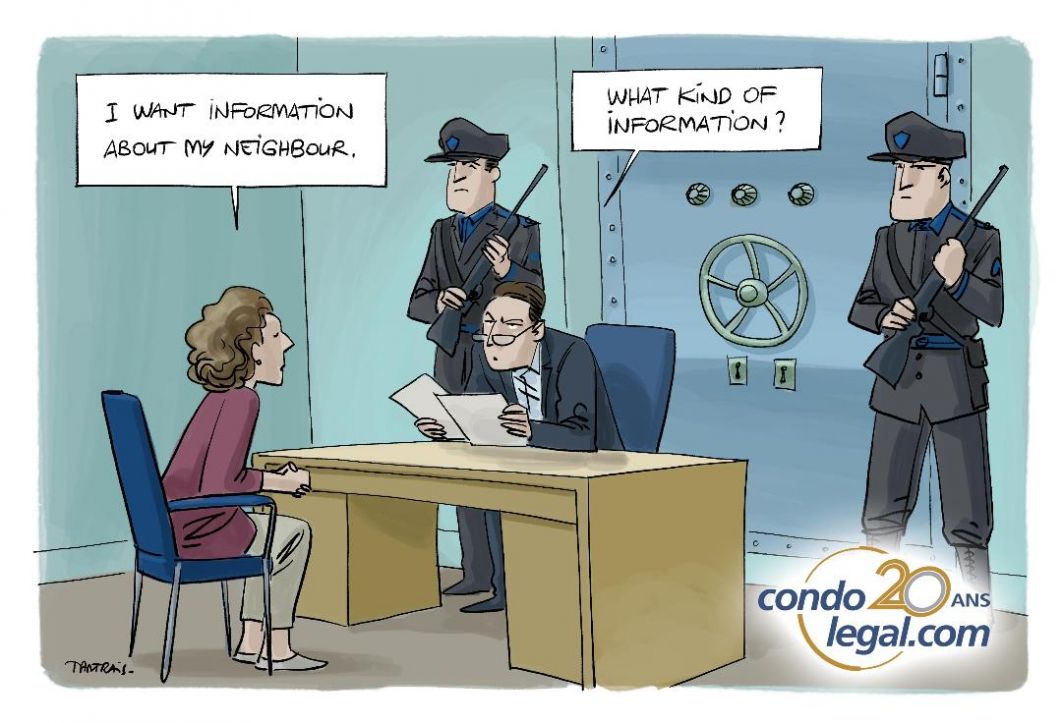Date published: 15/02/2025
Can the board of directors disclose the email addresses of the co-owners?
 When our board of directors communicates by email with co-owners, the addresses remain hidden, preventing any exchange between us. This seems contradictory, since our declaration of co-ownership requires us to provide our contact information, and the syndicate’s register contains these addresses. The right to privacy is invoked to justify this practice.
When our board of directors communicates by email with co-owners, the addresses remain hidden, preventing any exchange between us. This seems contradictory, since our declaration of co-ownership requires us to provide our contact information, and the syndicate’s register contains these addresses. The right to privacy is invoked to justify this practice.
Questions: Am I entitled to require the board of directors to provide me with the co-owners’ email addresses? Is there a legal way to access co-owners’ email addresses?
Answer: Access to co-owners’ email addresses is strictly regulated by the provisions of the Civil Code of Québec and the laws that ensure the protection of personal information.
Confidentiality of email addresses
Unlike mailing address, which must be registered in the syndicate’s register and accessible to co-owners, email addresses cannot be disclosed without express consent.
Article 1070 of the Civil Code of Québec, amended by Bill 16, specifies that:
“ Among the registers of the co-ownership, the syndicate keeps at the disposal of the co-owners a register containing the name and mailing address of each co-owner; the register may also contain other personal information concerning a co-owner or another occupant of the immovable if he expressly consents to it. In addition, the register contains the minutes of the meetings of the co-owners and of the board of directors, the resolutions in writing, the by-laws of the immovable and any amendments to them, and the financial statements.”
Thus, the only information that must be accessible to the co-owners is the postal address. Any other data, such as an email address, may only be communicated with the express consent of the co-owner concerned.
The obligation of the board of directors
The board of directors may collect the email addresses of the co-owners for the management of the co-ownership. However, this information is protected and cannot be shared without consent.
Section 37 of Civil code of Québec, which governs the confidentiality of personal information, provides that:
“ Every person who establishes a file on another person shall have a serious and legitimate reason for doing so. He may gather only information which is relevant to the stated objective of the file, and may not, without the consent of the person concerned or authorization by law, communicate such information to third persons or use it for purposes that are inconsistent with the purposes for which the file was established. In addition, he may not, when establishing or using the file, otherwise invade the privacy or injure the reputation of the person concerned.”
This means that, even if the board of directors holds the email addresses of the co-owners, it cannot disclose them without their prior consent.
In addition, section 34 of the Act to establish a legal framework for information technology imposes an obligation to protect confidential information, unless a co-owner expressly releases the board of directors from this obligation.
Can I demand that email addresses be communicated?
- No. Even if a majority of co-owners wish to share these addresses, a resolution at the meeting cannot force their disclosure, because this is personal information protected by law.
- Yes, only if each co-owner gives their written consent for their email address to be accessible to the other co-owners.
Alternative solutions to improve communication
If you want to encourage exchanges between co-owners, here are some options:
- Propose to co-owners to voluntarily authorize the communication of their email address via a list updated by the syndicate.
- Ask the board of directors to send a collective email on your behalf, allowing interested co-owners to respond directly.
- Suggest the creation of a private discussion space (e.g. forum, online discussion group) to allow exchanges without disclosing confidential information.
 WHAT YOU SHOULD KNOW! Co-owners' email addresses are protected by law and cannot be shared without their explicit consent.
WHAT YOU SHOULD KNOW! Co-owners' email addresses are protected by law and cannot be shared without their explicit consent.
 WARNING! The board of directors must respect these obligations, but alternatives exist to facilitate communication between co-owners while ensuring the confidentiality of personal information.
WARNING! The board of directors must respect these obligations, but alternatives exist to facilitate communication between co-owners while ensuring the confidentiality of personal information.
Back to questions and answers




